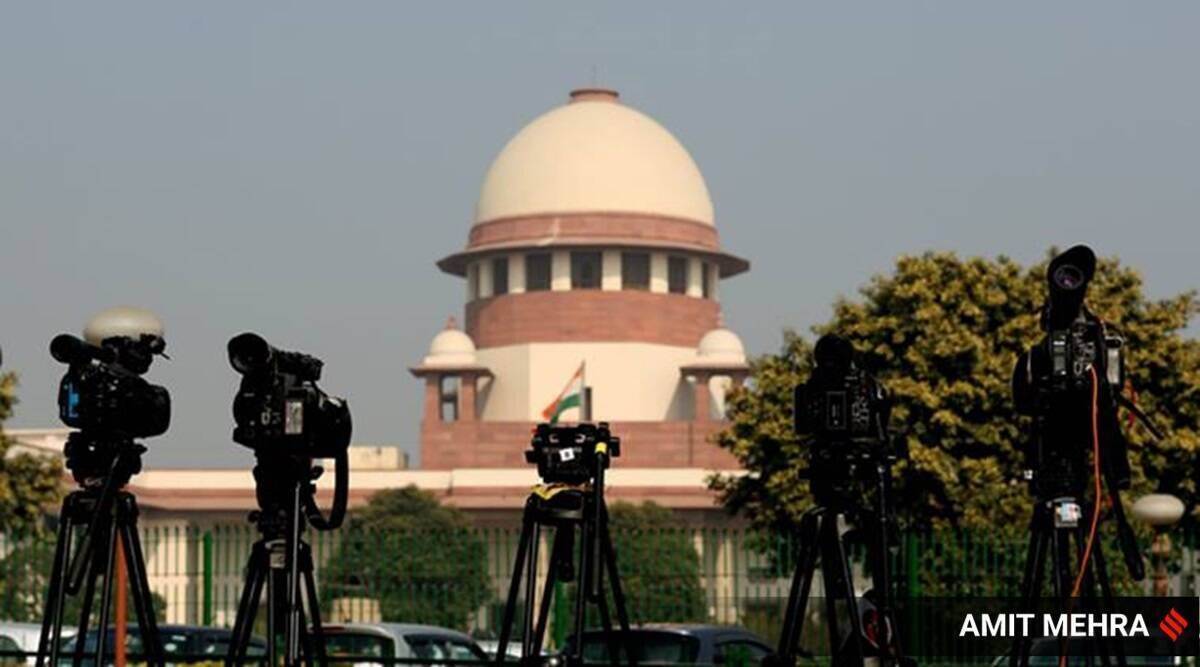 Solicitor General Tushar Mehta is likely to mention the plea before a bench headed by Chief Justice N V Ramana for urgent hearing. (File Photo)
Solicitor General Tushar Mehta is likely to mention the plea before a bench headed by Chief Justice N V Ramana for urgent hearing. (File Photo) The Supreme Court will hear on Monday Haryana government’s plea challenging the Punjab and Haryana High Court order staying its law that mandated 75 per cent reservation in the private sector for those who have domicile in the state.
On Friday, Solicitor General Tushar Mehta, appearing for the Haryana government, told Chief Justice of India N V Ramana during mentioning hours — when urgent matters are brought to the notice of the CJI — that the state had challenged the HC order and urged that it be taken up for hearing on February 7.
Mehta submitted that the HC passed Thursday’s interim order, staying the law, after hearing the state for only 90 seconds.
He added that the HC “order has not come out yet” and requested the appeal be listed “on Monday subject to placing the order on record”. The CJI agreed to the request.
The HC order came on Thursday on a plea by the Faridabad Industries Association and other associations from Haryana.
Meanwhile, a detailed order was released Friday on the high court website. A division bench of Justices Ajay Tewari and Pankaj Jain, while staying the Haryana State Employment of Local Candidates Act, 2020 said that “the core issue is whether any state can restrict
employment (even in the private Sector) on the basis of domicile.”
Meanwhile, the bench also added that written statements have only been filed in three petitions by Haryana. It thus granted four weeks time to the respondents to file written statements in the other connected matters. “The petitioners may file replications, if any, within a period of three weeks thereafter,” said the Bench.
Meanwhile, Chief Minister Manohar Lal Khattar said, “Haryana State Employment of Local Candidates Act, 2020 is implemented to strive employment opportunities for Haryanavi youth. We shall defend the case strongly so as to secure future of Haryana’s youth”.
Expressing optimism that the legislation will pass the judicial test and the youth of Haryana will get the right to employment, Deputy Chief Minister Dushyant Chautala said, “All the alternative provisions have been given in the law clarifying all the doubts and problems of the industrialists. It is a constitutionally sound law. We shall ensure that Haryanavi youth have access to jobs in the state, and that a struggle would be waged at every level to achieve this goal”.
Chautala, whose JJP had made 75 per cent quota for locals a key plank ahead of the 2019 Assembly elections, said, “Industries established in Haryana use the resources and infrastructure here and the laws of the state government are applicable to all. The provision of providing employment to the local youth is also a part of the agreement to set up industries, which industrialists have been avoiding till now. This Act will be implemented by taking relief from the legal process, and in any situation the youth of Haryana will be given a share in local jobs, even if another method or provision is required, it will be adopted,” he added.
The law, which came into force on January 15, provides 75 per cent reservation in the private sector to job seekers who are “domiciled in State of Haryana”. The law covers private companies, societies, trusts and partnership firms, and applies to jobs that offer a maximum gross monthly salary or wages of up to Rs 30,000. Central or state governments, or any organisation owned by these governments, are outside the ambit of the Act.
The law was opposed by industry associations on the ground that it would affect their business and make them less competitive.
The Gurgaon Industrial Association, one of the petitioners in the case, had earlier contended that the “sons of the soil” law was an infringement on the constitutional rights of employers. They also argued that private sector jobs are purely based on the employees’ skills and analytical bent of mind and that citizens of India have the constitutional right to seek jobs in any part of the country.
Reservation in private sector jobs was one of the key poll promises of the Jannayak Janta Party (JJP), which is part of the BJP-led government in the state. Haryana votes in Assembly election next year.
- The Indian Express website has been rated GREEN for its credibility and trustworthiness by Newsguard, a global service that rates news sources for their journalistic standards.

